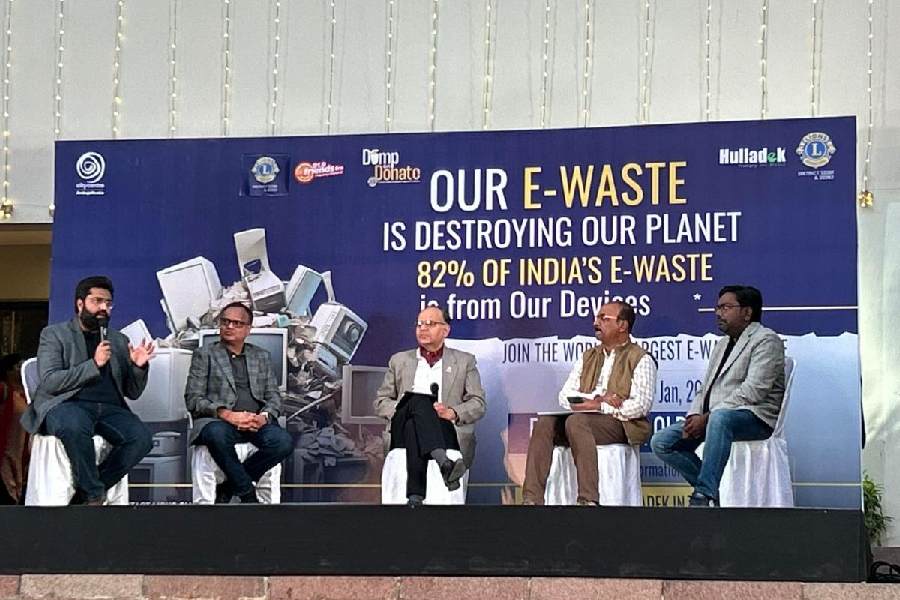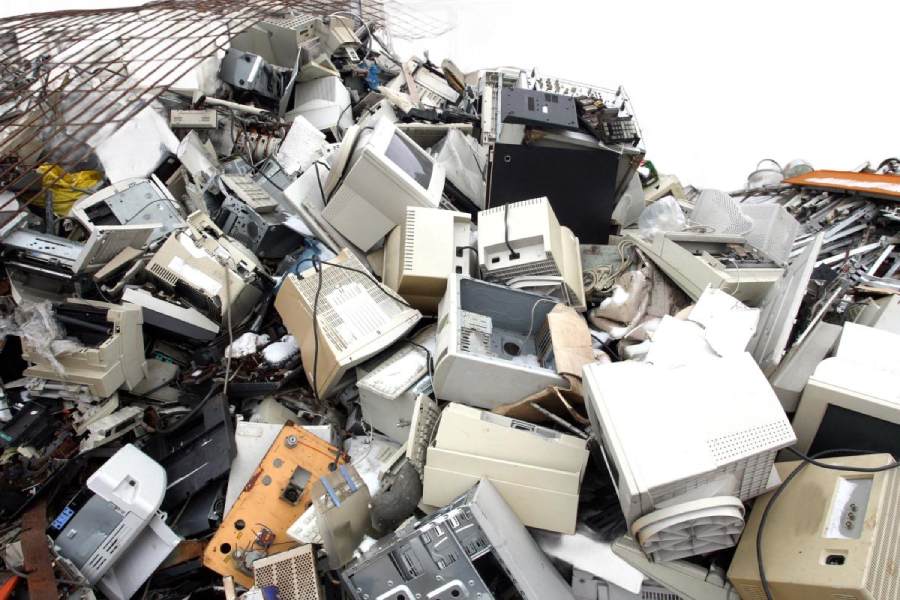Kolkata produces the maximum amount of e-waste in India and people are reluctant to go for repair or get refurbished electronic products. Such concerns were voiced at a panel discussion on e-waste collection drive, organised by Lions’ Clubs International District 322B1 and 322B2, in association with City Centre. The discussion took place on January 11 as part of a two-day e-waste collection drive at City Centre, bringing industry, regulatory authority, NGO and general people together to discuss the grave issue.
“People here lack the awareness that refurbished and used products are not the same. When we properly repair a used product and upgrade it through quality check, it becomes useable and as good as new. That is called a refurbished laptop. Nowadays, the tendency is to buy a new one instead of getting a gadget repaired. We ask people to go for refurbishment because it not only saves money, but the quality also is so remarkable that you can’t even differentiate a refurbished product from a new one. This way e-waste is reduced and resources are saved,” said Jitendra Lakhotia, founder, Lapitup.

(L-R) Nandan Mall, founder, Hulladek Recycling, Ravi Gupta, chairman, RG Cellulars, Ankur Chaturvedi, associate vice- president - health safety and environment, Emami, Anjan Fouzdar, senior environmental engineer, Pollution Control Board, and Jitendra Lakhotia, founder, LAPITUP, take part in the panel discussion at City Centre. The Telegraph
Data safety pointers
The biggest resistance to buying refurbished products comes from concerns about data safety. Addressing the concern, Lakhotia advised a factory reset. “In case of a mobile or a tablet, whenever you sell or go for an exchange, you should first go for a factory reset. Once a factory reset is done then data is not a concern. In case of laptops or desktops, remove your hard disk drive or solid-state drive (ssd). Then sell the laptop and recycle the ssd separately. Laptops and desktops which we provide come with new hard disk drives. So old data is not a concern,” he said.
If one is giving away a laptop or a desktop, he suggested extreme caution. “Whenever you are giving it to someone you have to be very responsible about it. Even if you delete the data, it can be retrieved. So it is better to format the drive or remove it from the device,” Lakhotia said.
Though they do face resistance when they try to convince people in various sectors, he said some small and medium-sized enterprises and corporate firms were using refurbished products.
E-wasteland
Ravi Gupta, chairman, RG Cellulars, appealed for a proper mechanism for recycling of e-waste. “Though the quantity of e-waste is just three per cent of the total solid waste generated in the world, the effect of this three per cent on the environment is more than that of the rest of the waste. The IT and telecom industries are the major producers of e-waste in the country, amounting to almost 80 per cent. We need to change our mindset of selling discarded gadgets in the unorganised sector. Instead we should get them recycled in a proper manner. All brands should initiate exchange or buy-back offers for their dysfunctional products so that they themselves can dispose of them. We are trying to reuse mobile phones by repairing them and gifting them for use to NGOs for educational purposes and thus reduce e-waste,” he said.
The concern about e-waste reaching the unorganised sector and not being properly disposed of was also voiced by an environmental engineer of the West Bengal Pollution Control Board (WBPCB), Anjan Fouzdar. He pointed out that most people were not aware of the hazardous consequences. “E-waste contains heavy metals which create carcinogenic fumes. E-waste management rules have been framed by the ministry of environment and forest in 2016 and further amended in 2022. Instead of the previous 21 items, 106 items have now been covered. But we are far from reaching compliance.”
He stressed on the role played by PROs (producer responsibility organisations), a professional enterprise authorised by producers, delegated with the responsibility to collect and channelise e-waste generated from the ‘end of life’ of their products. “There are a lot of producers, recyclers, refurbishers and bulk consumers and they must be guided by PROs about recycling,” he said.
Fouzdar added that the WBPCB had started awareness programmes through the distribution of e-waste collection bins in 5,000 schools across the state, under the National Green Corps.
Recycle, don’t sell
Nandan Mal, chairman of Hulladek Recycling, which is involved in collection and recycling of e-waste for 10 years, highlighted the challenges they face. “The main challenge is lack of awareness and acceptance. People hardly consider it a health hazard and tend to sell their e-waste, not recycle. Awareness programmes were conducted across the country, including in slum areas where we had children bringing us discarded electronic products. If you make people understand, it does not matter what economic status they belong to, intent does. We have set up 120 neighbourhood collection centres across the country. Kolkata alone has 25 centres and we are trying to increase the number. We even collect e-waste from the doorstep if one is unable to carry it to us,” Mal said.
Hulladek is working with some brands who are generously giving discount vouchers to those donating e-waste to them.
To ensure data security, the company removes the hard drives and destroys them. “There are a few data points in a hard drive or ssd. If you drill through them then the data is completely lost. Many organisations also ask for data wiping certifications. There are softwares available which can be used for this. It’s almost like decryption where all the data is broken down into millions of pixels of pieces and it cannot be joined together to create one logical information. Many such softwares are available on subscription. So in case someone does not want physical destruction of the hard disc drive but data deletion right in front of his eyes then we can run these softwares as well,” he added.
The panel was moderated by Ankur Choturvedi, associate ve-president, health safety and environment, Emami.
The camp, held in the kund area of City Centre, collected over 1,000 kg of e-waste over the two days, mostly from Lions Club members.
